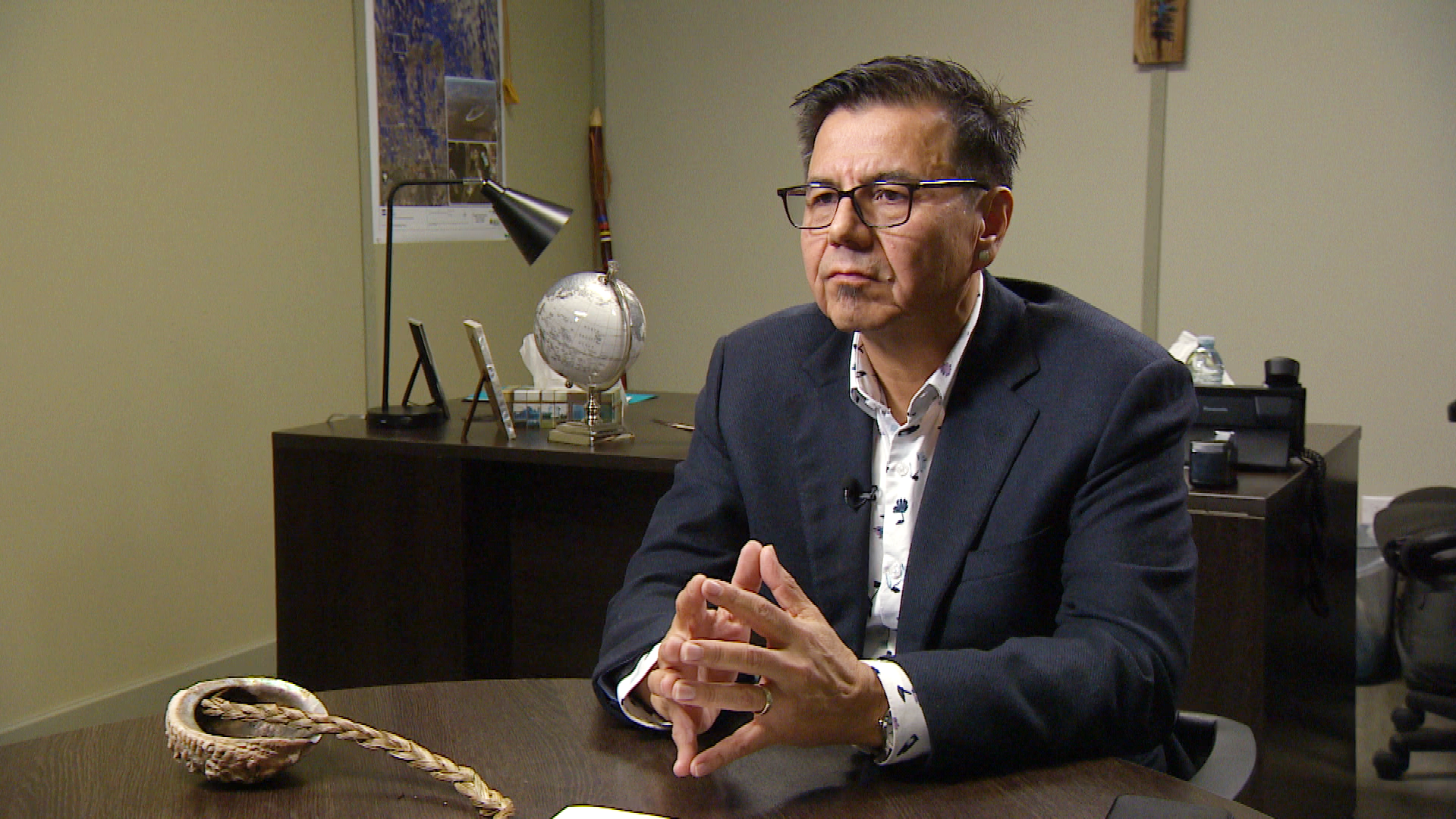Province sold Peguis nearly 3 acres of riverfront Winnipeg land for $350K. First Nation sold it 6 months later
The new chief of Manitoba's most populous First Nation wants to know why riverfront property it purchased in one of Winnipeg's most desirable residential neighbourhoods was flipped to a private developer instead of becoming part of its reserve lands.
Peguis First Nation acquired nearly three acres of land on the north side of Winnipeg's Wellington Crescent from the province in 2022 for $350,000, a sale price one real-estate professional calls "ridiculously low."
Less than a year later, that land was sold to a private developer who's now planning to build upscale condos along the Assiniboine River.
Peguis Chief Stan Bird said he's investigating the sale and resale of the land at 611 Wellington Cres., among other actions involving the Peguis First Nation Real Estate Trust, which has the stated goal of creating housing and engaging in off-reserve development.
"We're looking at financial records. We're looking at past correspondence, documentation, whatever we can get our hands on to shed light on why things were done a certain way or why certain deals were even carried out," said Bird, who was elected chief of the northern Interlake Cree and Ojibway community in April 2023.
"Our land is very much tied to our identity as a people. I mean, our language comes from the land, and without land, there is no culture. Without culture, of course, there is no identity, right? So our land is our identity."
The initial sale of the Wellington Crescent land took place in July 2022, when the province of Manitoba sold 2.8 acres of land on the river side of the leafy, mansion-lined boulevard to a numbered company owned by the chief and council of Peguis First Nation on behalf of its members.
The sale price: $350,000, or close to the value of an average single-family home in Winnipeg at the time.
The province says the transaction fell under the treaty land entitlement process, a mechanism intended to settle the land debt owed to First Nations that didn't receive all the property they were promised by the Crown.
The sale price was heavily discounted due to what the province described as the distressed state of the property, which required riverbank stabilization, asbestos removal and the demolition of an old hospital.
Unlike dozens of previous acquisitions under the treaty land entitlement process, Peguis did not apply to incorporate the Wellington Crescent property into its reserve, Indigenous Services Canada said.
About six months after the Peguis-owned numbered company purchased the Wellington Crescent land, that company was sold to a private developer who now plans to build 14 luxury homes on the property.
The Peguis First Nation Real Estate Trust declared on its website the land was sold for $2.8 million but pegged profits on the land flip at $1.8 million.
Chief Bird said he's investigating the transactions because he doesn't know why the riverfront plot was flipped.
"I don't know why the land was purchased and sold to a private developer," Bird said. "We are concerned about this purchase and we are continuing to investigate."
Greg Stevenson, a trustee with the Peguis First Nation Real Estate Trust, questioned why Bird is concerned about the transactions.
"It's just a normal business deal, right?" said Stevenson, who also works as a consultant for M. Richard & Associates, a Winnipeg planning firm. "There's nothing that's different from any other business deal."
Bird has been chief for almost a year and ought to be familiar with the transactions, Stevenson said.
Long struggle to regain land
Peguis First Nation has struggled for more than a century to receive compensation for the lands it lost after European settlers arrived in the province.
Its reserve lands once included fertile agricultural tracts at St. Peter's, along the Red River, in what's now the rural municipality of St. Clements. In 1907, the First Nation was forced to surrender that land and move to a flood-prone area of the northern Interlake.
In a treaty land entitlement agreement in 2008, Peguis received $64 million plus a commitment of 167,000 acres of both Crown and private land. The following year, the federal government paid Peguis $126 million to settle the illegal surrender of the reserve property northeast of Selkirk.
Bird said acquiring the Wellington Crescent property under the treaty land entitlement process and then flipping it for a profit is at odds with Peguis's efforts to regain what it lost.
"It's not simply a monetary exchange for a piece of property. It goes far beyond that," said Bird, describing any profit realized by Peguis in the transaction as a secondary consideration.
"The fact is that we were swindled out of land, and there's a process in place now for us to regain some of that. I think that has to be the primary consideration."
Peguis has other financial pressures. The First Nation is fighting a $172-million lawsuit from the court-appointed receiver for an insolvent Toronto lender that provided Peguis loans at an interest rate of prime plus 11 per cent.
As well, Indigenous Services Canada has required Peguis since 2016 to develop a management plan to deal with an issue with the way the First Nation handles its finances, Indigenous Services Canada spokesperson Anispiragas Piragasanathar said.
Shriner's hospital no more
The riverfront land at 611 Wellington Cres. was formerly a children's hospital.
The facility opened in 1949 as the Shriner's Hospital for Crippled Children and was turned over to the province of Manitoba in 1977, when it became the Rehabilitation Centre for Children, the Manitoba Historical Society says.
The rehab centre closed in 2016. The province declared the riverfront plot surplus three years later, and then in 2020, offered it to five First Nations eligible to acquire Crown lands under the treaty land-entitlement process: Peguis, Brokenhead, Long Plain, Roseau River and Swan Lake.
Peguis was the only one of the five to express an interest in the property, the province said.
In fall 2021, Peguis consultant Andrew Marquess — best known as the developer of the Parker lands and other properties along Winnipeg's rapid-transit corridor — commissioned several studies about 611 Wellington Cres.
Records obtained by CBC News from a confidential source show a Marquess-owned company commissioned a riverbank assessment that estimated any future development of the site would require $1.9 million worth of stabilization work.
Those records also show a former Marquess employee named Walter Parfeniuk received a $276,000 estimate, plus GST, for demolishing the former hospital, excavating the site and removing hazardous waste.
In a Dec. 11, 2021, email obtained by CBC News, Marquess advised Peguis First Nation's chief and council that he created a company that "will take title" of 611 Wellington Cres., and the company would be owned by the Peguis First Nation Real Estate Trust.
Marquess said Peguis could subdivide the property into several lots and sell them, generating a profit in the range of $2.1 million to $2.5 million.
"I think this is a good purchase and I can make this happen," Marquess advised in an email obtained by CBC News.
"Peguis should move forward with this purchase."
Marquess then asked Winnipeg property-appraisal firm Browaty & Associates to determine the value of the land.
That appraisal, obtained by CBC News, pegged the market value of 611 Wellington Cres. at $1.8 million. The estimate also said the land would be worth as much as $5.4 million if the profit for the developer, a realty commission, "miscellaneous expenses" and costs for demolition and riverbank stabilization were not taken into account.
The province ended up selling the plot for $350,000 in a transaction that concluded on July 11, 2022.
The province said the sale price was based on an appraisal of the land's fair market value, in "as is" condition, conducted by Altus Group in 2017.
While the province declined repeated requests to make this appraisal public, a senior provincial official said that valuation took into account the need to do $4.3 million worth of riverbank stabilization at the site, remove asbestos from the old hospital and demolish the 1949 structure.
"That was a super distressed property," said the senior provincial official, who spoke to CBC News on the condition their name would not be published.
"If anybody wanted to repurpose it, it would cost an absolute fortune."
The official could not explain the apparent gulf between the financial assumptions underlying the province's 2017 appraisal and the ones from the documents commissioned by Marquess in 2021 and 2022.
In a 2023 tax notice, the City of Winnipeg assessed the property at $4.9 million.
'Ridiculously low' price
Bob Antymniuk, a commercial real estate broker in Winnipeg, described the $350,000 sale price for the 2.8-acre Wellington Crescent parcel as "ridiculously low," even when the cost of improvements is factored in.
"I think that this land ought to be probably worth at least $1.5 million an acre, likely more," Antymniuk said in an interview at the Portage Avenue office of his firm, Capital Commercial Real Estate Services.
A very long list of developers would have lined up for a shot at purchasing nearly three acres of riverfront land on Wellington Crescent for $350,000, he said.
"It'd be a very, very desirable piece of property, especially for that price," he said.
Marquess implied Peguis received a discount from the province because it is a First Nation.
"You and I don't get that opportunity," he said when asked about the $350,000 sale price in a January interview.
"I'm not sure it's a fair question, given all the other factors of the province's role and relationship with Indigenous communities."
According to the framework for the sale of lands under the treaty land entitlement process, surplus Crown lands are supposed to be sold at fair market value.
But there are occasions when Crown land is sold to First Nations below fair market value, said Yvan Guy Larocque, a Métis lawyer in Winnipeg with expertise in treaty land entitlement.
"It is in the spirit of reconciliation, I think, when those things happen," said Larocque, the founder of Larocque Business Law and a clinical instructor in the faculty of law at the University of Manitoba.
Such discounts can be seen as economic reconciliation, Larocque said.
The senior provincial official who spoke to CBC News about the sale of 611 Wellington Cres. made no mention of a reconciliation-related discount.
That official said the provincial Treasury Board ultimately approved the sale.
What Peguis did with the land after it was purchased is not something the province would question, the official suggested.
'Nothing like it'
Ten days after Peguis-controlled 10115382 Manitoba Inc. purchased 611 Wellington Cres., the Marquess-owned 6748831 Manitoba Inc. applied for a demolition permit.
The building was demolished in October 2022.
Three months later, Peguis parted ways with the land.
On Jan. 27, 2023, developer Marc Kipnes and his company Crystal Ionics purchased 10115382 Manitoba Inc. in a transaction listed at $2.8 million on the Peguis First Nation Real Estate Trust website.
Kipnes has a 17-year track record of developing condos in Tuxedo, South St. Vital and other Winnipeg neighbourhoods.
Kipnes confirmed he purchased the numbered company that held title to the land after he was informed it was available by Tom Blumberg, a broker with Winnipeg's Monopoly Realty.
"There's nothing like it," Kipnes said via text.
He plans to ask city council to rezone the land this spring so he can build 14 units on the land.
Blumberg said he'd been interested in 611 Wellington Cres. ever since the former children's rehabilitation centre closed in 2016, and he contacted the minister about its availability before it was sold to Peguis.
Blumberg said his earlier interest must have been noted.
"My name was obviously left on the list somehow and it got back to Andrew Marquess, who was basically running the group for Peguis, doing their consulting work," Blumberg said in a telephone interview.
Marquess also invited several other parties to bid, he said.
"That never really got to the general public, per se, but he did contact and reach out to a number of different parties," he said.
"I happened to have a group that I knew that had been interested in the land for a long time."
Blumberg said his group, led by Kipnes, made a successful offer to purchase the land as part of a sealed bid process.
What the real estate trust described as a $2.8-million deal did not include the riverbank stabilization work. The scope of that won't be determined until city council approves the final design, Blumberg said.
"It's pretty hard to undertake the stabilization until you know what exactly you're building," he said.
'Our community was left in the dark'
Sitting in his office in Peguis First Nation, Chief Bird said he doesn't know why Peguis bought and then sold valuable residential property it could have developed on its own.
"It put us in a really good position, but again, that was taken away. So my question is, why?" he asked.
"I feel a bit angry about that. Our community was left in the dark."
Stevenson, the trustee with the Peguis First Nation Investment Trust, said the trust operates autonomously and had every right to flip the Wellington Crescent land.
Every transaction the trust undertakes is for the benefit of Peguis First Nation, Stevenson said, and he is not sure why Bird did not simply call him if he has questions.
"We're trying to build a community here using our real estate trust, knowledge and the people we work with," he said. "This seems like it's a hurdle being built to prevent us from doing that."
In a subsequent email, Stevenson said the trustees for Peguis First Nation Real Estate Trust have been trying to meet with Bird but have not been able to secure a meeting.
"We would welcome a meeting at any time if the chief and council have time in their schedule," Stevenson said.
WATCH | New Peguis Chief Stan Bird wants to know why his First Nation sold its land on Wellington Cres.:

Peguis Chief Stan Bird angered over land sale
6 hours ago
The new chief of Manitoba’s most populous First Nation wants to know why riverfront property it purchased in one of Winnipeg’s most desirable residential neighbourhoods was flipped to a private developer instead of becoming part of its reserve lands.
Bird said he does not understand the information he has seen and he has further questions about Peguis First Nation Real Estate Trust's accounting of the 611 Wellington sale.
In a description of the $2.8-million sale posted on the real estate trust's website, the profits are listed as $1.83-million.
Financial statements posted by the Peguis First Nation Investment Trust say the gross profits on a $2.8-million sale are $1.44 million.
In a text message, Stevenson said he checked with his accountant to explain the roughly $400,000 difference between the two stated profits.
He said $350,000 was for the land purchase and $50,000 was for consulting and legal fees.
Bird said he also has questions for Marquess, whom he characterized as the architect of the 611 Wellington Cres. purchase and sale.
Marquess said it was not his idea for Peguis to purchase 611 Wellington Cres.
"I didn't find out about the land being available. It was the real estate trust that found out," he said. "They obviously had been talking to the province and then came to me."
The Winnipeg developer said he only tried to provide some advice to the Peguis trust.
"We helped out on some experts and engineering reports, and there's a lot of challenges with the land, riverbank stabilization."
When asked about the role of his former employee Parfeniuk in the 611 Wellington Cres. project, Marquess said he asked Parfeniuk to solicit a demolition quote.
Stevenson described Parfeniuk as a real estate advisor to the Peguis First Nation Real Estate Trust.
Marquess said he didn't know why Parfeniuk was appointed a year and a half ago as a director of the Chief Peguis Investment Corporation, a separate company created more than a decade ago to pursue investments on behalf of Peguis First Nation.
Parfeniuk declined an interview request.
Marquess ultimately deferred questions about 611 Wellington Cres. to Stevenson.
Stevenson, in turn, described Marquess both as an advisor and developer for the real estate trust.
Stevenson said Marquess continues to work for the real estate trust.
Ryan McCorrister, another trustee with the Peguis First Nation Real Estate Trust and the director of the numbered company that bought 611 Wellington Cres. from the province, deferred questions about the real estate trust's finances to Marquess.
McCorrister deferred questions about the land transactions to Glenn Hudson, who served as the chief of Peguis First Nation before Bird was elected.
Hudson said he has no comment on the 611 Wellington sale because it was "completed and done under Peguis [First Nation] Real Estate Trust."
Lawyer: No reason First Nations can't flip land
Larocque, the Winnipeg lawyer, said it is common to see a new chief and council criticize the actions of the preceding leadership at a First Nation.
"It's politics," he said. "It's no different than the NDP discovering a larger deficit and blaming the PCs, right? So we have to take that with a grain of salt."
Larocque said there's no reason a First Nation has to hold on to land it acquires from the Crown under the treaty land entitlement process. First Nations that buy and sell land can be seen as exercising their rights, he said.
WATCH | First Nations have autonomy, says Métis lawyer:

First Nations that buy, sell land can be seen as exercising their rights: Métis lawyer
6 hours ago
Yvan Guy Larocque, a Métis lawyer in Winnipeg with expertise in treaty land entitlement, says there's no reason a First Nation has to hold on to land it acquires from the Crown under the treaty land entitlement process.
"They have autonomy and they have a right to self-determination in relation to economic development and self-governance," Larocque said.
"So if their internal processes were followed and their council at the time made a decision that was in the best interest of the nation, I don't see an issue with it.
"However, it sounds like potentially there's some question around that."
Chief Bird made it clear that he has questions about the resale of property acquired under the treaty land process.
"The whole nature of that trust was to improve the lives of our people, but that hasn't improved the lives of our people."
611 Wellington Crescent: A timeline
1949: The Shriner's Hospital for Crippled Children opens at 611 Wellington Cres.
1977: The hospital is transferred to the province and becomes the Rehabilitation Centre for Children.
2016: The rehabilitation centre closes.
2017: Altus Group does a property appraisal of 611 Wellington Cres. for the province.
2019: The province declares 611 Wellington Cres. surplus to its needs.
2020: The province offers the land to five First Nations, including Peguis.
July 28, 2021: The Peguis First Nation Real Estate Trust is created. Ryan McCorrister is listed as an initial trustee along with Greg Stevenson, William Spence, Candace McCorrister and Sheena Walker. Candace McCorrister has since resigned.
Nov 16, 2021: A numbered company called 10115382 Manitoba Ltd. is created by a lawyer at Thompson Dorfman Sweatman. One month later its ownership is listed as "the chief and council of Peguis First Nation from time to time of Peguis First Nation in trust." Ryan McCorrister is listed as president, secretary and director.
Nov. 25, 2021: A riverbank assessment commissioned by the Marquess-owned 6748831 Manitoba Inc. estimates future development of the land would require $1.9 million worth of riverbank stabilization work.
Dec. 7, 2021: Walter Parfeniuk, a former Marquess employee, obtains a $276,000 quote for demolishing the old hospital, excavating underground structures and removing asbestos.
Dec. 11, 2021: Marquess advises Peguis chief and council to approve the purchase of 611 Wellington Cres.
May 25, 2022: A property appraisal by Browaty & Associates, commissioned by Marquess, estimates the value of 611 Wellington Cres. at $1.8 million.
June 3, 2022: The City of Winnipeg taxation department assesses the value of 611 Wellington Cres. at $4.9 million.
July 11, 2022: Manitoba sells 611 Wellington Cres. to the Peguis-controlled 10115382 Manitoba Ltd. for $350,000.
July 21, 2022: The Marquess-owned 6748831 Manitoba Inc. applies to demolish the old hospital.
Fall 2022: The hospital is demolished.
Jan. 27, 2023: 10115382 Manitoba Ltd., which owns 611 Wellington Cres., is sold to Marc Kipnes and his company Crystal Ionics. The Peguis First Nation Investment Trust website lists the sale price as $2.8 million.
April 7, 2023: Stan Bird becomes chief of Peguis First Nation, defeating Glenn Hudson.
Spring 2024: Kipnes plans to ask city council to rezone 611 Wellington Cres. to allow for the construction of 14 units on the land.
ABOUT THE AUTHOR
Senior reporter, CBC Manitoba
Bartley Kives joined CBC Manitoba in 2016. Prior to that, he spent three years at the Winnipeg Sun and 18 at the Winnipeg Free Press, writing about politics, music, food and outdoor recreation. He's the author of the Canadian bestseller A Daytripper's Guide to Manitoba: Exploring Canada's Undiscovered Province and co-author of both Stuck in the Middle: Dissenting Views of Winnipeg and Stuck In The Middle 2: Defining Views of Manitoba.
*****
Credit belongs to : www.cbc.ca
 MaharlikaNews | Canada Leading Online Filipino Newspaper Portal The No. 1 most engaged information website for Filipino – Canadian in Canada. MaharlikaNews.com received almost a quarter a million visitors in 2020.
MaharlikaNews | Canada Leading Online Filipino Newspaper Portal The No. 1 most engaged information website for Filipino – Canadian in Canada. MaharlikaNews.com received almost a quarter a million visitors in 2020.







